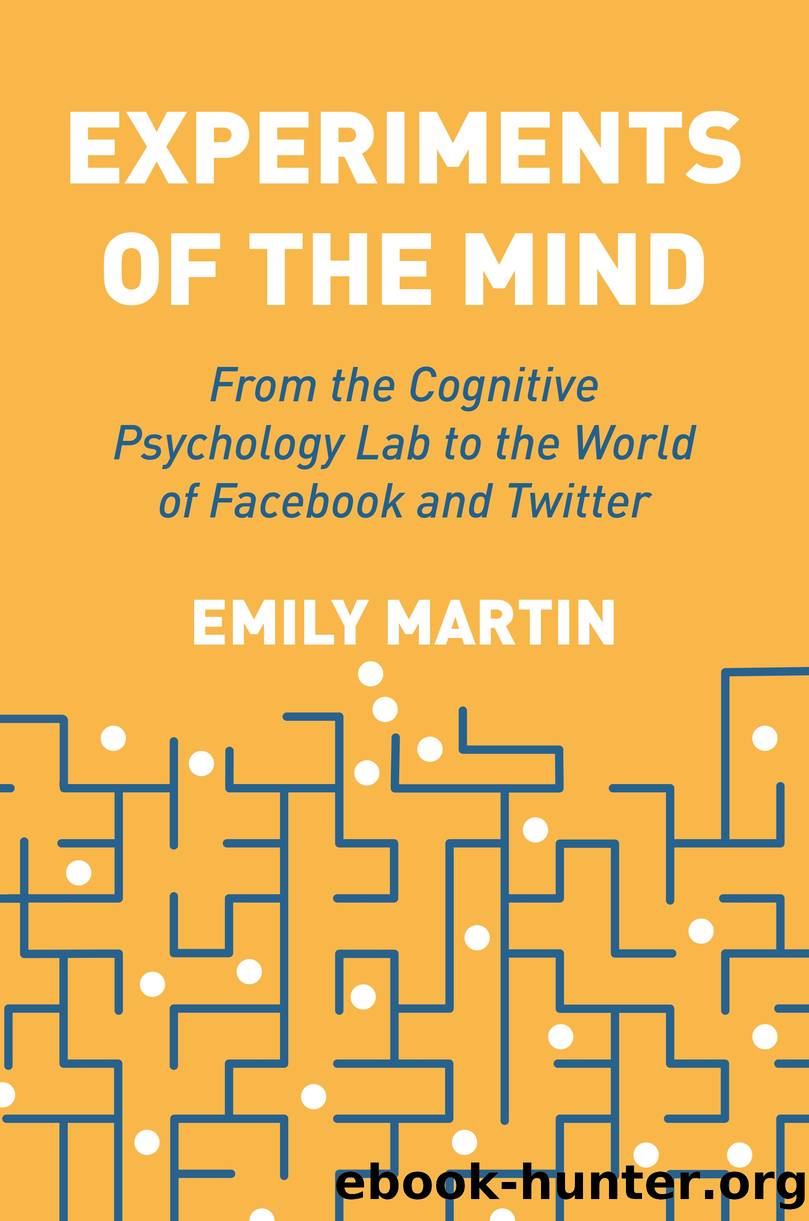Experiments of the Mind by Emily Martin;

Author:Emily Martin;
Language: eng
Format: epub
Publisher: Princeton University Press
Published: 2021-08-28T00:00:00+00:00
Publication as a Technology
So far I have focused on the difficulties of harnessing technologies for specific purposes: not knowing whether a signal is exciting or inhibiting, having to help the signal emerge from noise, contending with perturbations from subjectsâ movements, or making do with increased blood flow as a sign of neural processing. Given all this, one might wonder what actual contributions these techniques are able to make to our knowledge of how the brain or mind works. If we remember that most cognitive processes of interest in experimental psychology are not accessible to conscious awareness, then all information about the location or timing of cognitive processing in the brain is a significant new contribution to knowledge. Through a great deal of experimental effort, psychologists have determined from the EEG that as the milliseconds pass by, certain times (100 milliseconds, 300 milliseconds, 400 milliseconds) are associated with particular kinds of cognitive activity. At 100 milliseconds, the brain is processing low-level data like seeing or hearing; at 300 milliseconds, it is processing higher level functions like decision making; at 400 milliseconds, it is processing unexpected novel information. So, experimenters can design experimental tasks or stimuli that sort out when a response is detected and therefore what kind of cognitive processing is going on. A classic EEG/ERP (event-related potential) study in 1980 by Marta Kutas and Steven Hillyard, for example, showed that a novel semantic stimulus (âhe took a book out of the dogâ) produced a large response at 400 milliseconds, while an ordinary semantic stimulus (âhe took a book out of the libraryâ) did not. Hence the experiment could show that the response at 400 milliseconds involved higher-level semantic processing.11 This was important because it demonstrated that a longer delay was evidence of more complex cognitive processing.
In fMRI research about where cognitive activity is located, a 2001 study by Paul Downing and colleagues showed that specific areas of the brain activate more strongly in response to images of body parts than to any other objects.12 Perhaps this showed that the brain is modular, with specialized locations for specialized stimuli. Further research by James Haxby and colleagues (also in 2001) showed that the pattern of activation in certain broad regions of the brain correlated with images of different kinds of objects (faces, houses, cats).13 Thus research could progress from the idea that the brain is modular (specific brain locations process specific stimuli) to the idea that cognitive processing is overlapping and distributed.
Randall tried to give me a sense of what it means to get from the moment when the subjects walk out of room to being able to use their data.
The gap is huge, and we have to devote a lot of time to this. When you read any published paper, none of this stuff is ever written about. Of course, there is a huge section on method, and it will detail a little bit about how your physiological response or brain data was processed. Because we are interested in these waveforms, we tell you which waveforms enter in, how we got them, and how we created our averages.
Download
This site does not store any files on its server. We only index and link to content provided by other sites. Please contact the content providers to delete copyright contents if any and email us, we'll remove relevant links or contents immediately.
Cecilia; Or, Memoirs of an Heiress — Volume 1 by Fanny Burney(32023)
Cecilia; Or, Memoirs of an Heiress — Volume 3 by Fanny Burney(31438)
Cecilia; Or, Memoirs of an Heiress — Volume 2 by Fanny Burney(31386)
The Great Music City by Andrea Baker(30759)
We're Going to Need More Wine by Gabrielle Union(18608)
All the Missing Girls by Megan Miranda(14623)
Pimp by Iceberg Slim(13752)
Bombshells: Glamour Girls of a Lifetime by Sullivan Steve(13667)
Fifty Shades Freed by E L James(12889)
Talking to Strangers by Malcolm Gladwell(12826)
Norse Mythology by Gaiman Neil(12794)
For the Love of Europe by Rick Steves(11339)
Crazy Rich Asians by Kevin Kwan(8864)
Mindhunter: Inside the FBI's Elite Serial Crime Unit by John E. Douglas & Mark Olshaker(8667)
The Lost Art of Listening by Michael P. Nichols(7138)
Enlightenment Now: The Case for Reason, Science, Humanism, and Progress by Steven Pinker(6855)
The Four Agreements by Don Miguel Ruiz(6289)
Bad Blood by John Carreyrou(6258)
Weapons of Math Destruction by Cathy O'Neil(5803)
